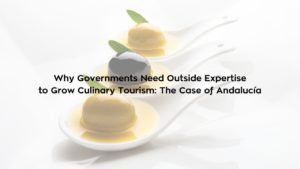Why Governments Need Outside Expertise to Grow Culinary Tourism: The Case of Andalucía

Part 1 in Power of Food Tourism, a new thought leadership series about the tremendous and undeniable power of food and beverage tourism.
Food is a cornerstone that sustains all living beings and connects people across the globe. As society has advanced, food has grown to become an item of admiration as well as of sustenance. In many destinations where tourism has flourished for decades, foods and beverages have taken on an even larger role in attracting people to visit. Culinary tourism, or food and beverage tourism, provides citizens a proper reflection of their culture as well as a tool to sustain and grow their economy. Destinations with a rich food culture have too often been held back from taking advantage of this due to management failure and resistance toward consulting outside specialists in food and beverage tourism.
Case Study: Andalucia, Spain
The example of the Spanish province of Andalucia provides key insights into what happens when a destination does not develop gastronomy tourism to its fullest potential.
In Andalucia, 80% of tourism historically has been beach tourism. People tended to visit only for the good weather rather than the plentiful food products that show off Andalucia’s rich culture. For many decades, the Andalucian government focused on maximizing accommodation reservations only along the coast. Then in recent years, Andalucia’s wines began to gain international attention. Andalucia produces a large percentage of Spain’s wine, which ranks third overall in the world, producing 13% of the world’s wine. As a result, Andalucia receives 3 million wine tourists annually.
While Andalucia is a large wine-producing region, it also produces another product that should be the source of more international tourism – olive oil. Olive oil tourism ( oleoturismo in Spanish) could be a significant source of pride and income for Andalusians. Olive oil has been produced in Andalucia since the Roman times and has been central to Andalucia’s economic prosperity, its cuisine and culture. Olive oil is incorporated into almost every typical Andalusian dish, including dishes such as gazpacho, salmorejo, and berenjena frita.
Today, Andalucia, a region the size of the island of Ireland , produces 85% of Spain’s olive oil and 32% of the world’s total supply of olive oil. Despite the fact that Andalucia’s olive oil production dwarfs its wine production in terms of relative scale, only 200,000 olive oil tourists visit annually. Even more unfortunate, 72.4% of the 200,000 olive oil tourists are local Andalusians , meaning they don’t stay overnight. Long-distance gastronomic tourists generally spend more per day (between €65 and €100 [sic] per day) than the average tourist in Andalucia (only €68 per day ). Therefore, the failure to promote olive oil tourism is an enormous missed opportunity for the region. Andalucia is clearly capable of attracting wine and beach tourists and earning money that way. It seems that destination marketers missed the opportunities available with olive oil tourism.
While there are many factors to consider in Andalucia, much of the missed opportunities have stemmed from a lack of understanding of the difference between the demand coming from local tourists and that coming from foreign tourists. A study from the University of Jaén (a university based in the Andalusian region of Jaén) revealed that there are four distinct profiles of olive oil tourists. Of these four profiles, two consistently spend more money and stay overnight in the locality, and both of these types of tourists desire to learn about and experience the properties of olive oil. Throughout much of the history of oleoturismo of Andalucia, many of the oleoturismo plantations have not allowed for close contact with the production site.
Recently, for reasons that are not entirely clear, although we surmise that the above research was an important contributing factor, the oleoturismo industry in Andalucia has been improving. Now many olive oil production sites combine their offer with tapas tastings and full factory tours. The Andalusian tourism office even opened a website with a searchable map for all olive oil tourism sites in the province. Since the tourism office began to understand Andalucia’s visitors, they have begun to package better their tourism offers and provide closer contact with the olive oil production process, which has led to a rise in tourism that could have happened long ago.
The case of Andalucia provides insights into how specific industry expertise can be leveraged to develop food and beverage tourism. Andalucia initially approached oil tourism as a tertiary concern, and one that was only of interest to local tourists. Its olive oil tourism industry was largely left out of tourism marketing because Andalucia made less effort to attract international travelers and they did not properly analyze their visitor profiles. External research showed the value proposition and olive oil tourism was born! Olive oil tourism in Andalucia seems to be growing, although largely still with local tourists, due to current pandemic travel restrictions.
THE ROLE OF EXTERNAL EXPERTISE IN FOOD AND BEVERAGE TOURISM
To many governments engaged in destination marketing, purchasing research or hiring experts to help with the specific development of food and beverage tourism is often seen as an unnecessary or even frivolous expense. However, external food and beverage tourism expertise can create enormous new opportunities for the entire tourist destination, as it did for Andalucia.
Destination governments need food and beverage tourism expertise to help connect value chains. Such expertise can benefit everyone from farmers to restaurant managers. Experts in food and beverage tourism management analyze ratings, recommendations, and average spending in order to determine which food and beverage tourism operations need more or less investment. In total, tourists spend 25% of their budget on food and drink. Some destinations like Ireland have seen tourists spend as much as 36% of tourism expenditures on food. This can lead to increased employment, along with other local benefits. For example, Canada (a country of 38 million) employs more than 400 thousand individuals because of food and beverage tourism.
Experts in food and beverage tourism management also promote cultural understanding with food and beverage tourism products to the growing food and beverage tourism market. As food and beverage tourism continues to expand globally, more food- and beverage-loving travelers will enter the market, and a wider variety of culinary profiles are emerging. Currently, the World Food Travel Association identifies 13 distinct food lover personas , called PsychoCulinary profiles. Such expertise can help destinations to analyze inbound culinary travelers, understand their different preferences, and laser-target specific food and beverage tourism opportunities toward each of those profiles who will best appreciate the different facets of the culture.
Perhaps most importantly, food and beverage tourism experts who are well-connected can help to spread the word with media, early adopters and other influencers. The ultimate goal for governments should be to have visitors return and encourage their friends and family to visit too through positive word-of-mouth. Gaining a deeper understanding of culinary traveler motivations is essential. For example, a study on the Extremadura (region of Spain) city of Cáceres found that more than 50% said they visited the city to try the cuisine. It was the second most common reason for visit , but it was associated with a strong positive correlation to the most common reason to visit: to understand the culture better. Ultimately, tourism in Cáceres is growing because of repeat visitors. The World Food Travel Association’s recent Food Travel Monitor discusses culinary traveler motivation and the customer journey process in great detail.
Food and beverage tourism specialists can help identify and preempt potential pitfalls in destination management, like with food safety, food quality, missed export opportunities and innovation opportunities. Specialists can help destinations to avoid mistakes, and help identify often overlooked issues in stakeholder management.
CONCLUSION
The case of Andalucia reflects the importance and power of food and beverage tourism expertise. Andalucia’s early failure was caused by a lack of understanding which products they could or should promote. Instead of focusing more of their efforts on one of their unique value propositions of Andalucia (olive oil), Andalucia instead focused its efforts on a product many other regions also have in abundance, namely beaches. With most European countries offering beaches, Andalucia’s beach offering is hardly unique. Food and beverage tourism expertise, which in this case was third-party research, helped Andalucia recognize what it was missing.
Destinations need food and beverage tourism experts to help them to make the right decisions. These experts have access to specialized research, creative thinkers, and other experts, all of which can combine for a destination to realize its full potential with food and beverage tourism. Pre-pandemic, more people than ever (fully 53% of travelers) chose their destination based on its gastronomy offering. It stands to reason then that developing food and beverage tourism deserves extra attention and planning to yield its full economic and community potentials.
Written by Ben Palmer. Edited by Erik Wolf.


© World Food Travel Association | All rights reserved.
Terms & Conditions |
Privacy Policy
Pages not loading correctly? We do not recommend Safari. Our website works best with Edge, Opera, Chrome, Brave or Firefox.








